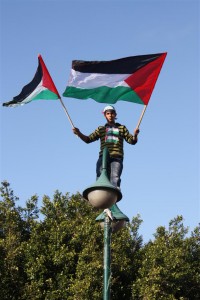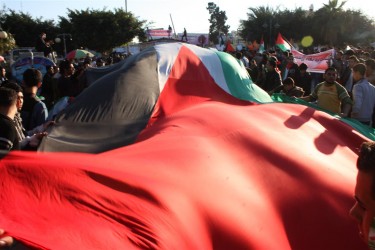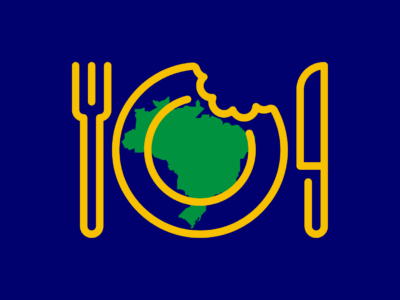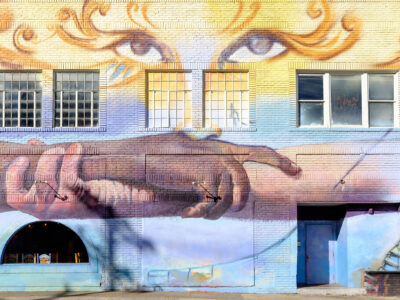Palestinos não foram mencionados logo de início na “linha do tempo da revolução árabe“, mas uma data para os protestos foi realmente estabelecida como 15 de março. Esses protestos estão ocorrendo em cidades e vilas por toda a Cisjordânia e por toda a Faixa de Gaza, e o foco é a unidade palestina – um levante contra as divisões políticas que têm dividido a sociedade palestina por muitos anos.
O clamor inicial é por unidade e reconciliação, mas outras exigências incluem a libertação de todos os prisioneiros políticos mantidos pelo governo em Gaza e pela Autoridade Palestina na Cisjordânia, além da total representação democrática dos palestinos em todo o mundo. Os protestos, como em outras partes do mundo árabe, são descentralizados e organizados por uma coalição de grupos jovens, incluindo o Gaza Youth Breaks Out [en] (ou, “Juventude de Gaza Liberta”, em tradução livre). Entretanto há o temor de que facções políticas tentem cooptar o movimento [en].
Laila El-Haddad explica por que os palestinos estão se manifestando [en]:
Over the past few weeks, I was asked a lot of questions, but perhaps none more than – what about Palestine? Why aren’t the youth rising up there?
Besides the fact that Palestine is a different paradigm altogether – what with an Israeli occupying regime on one hand – and two pseudo non-sovereign governments on the other, we also have the precedent of Palestinians already having risen up – twice (first and second Intifadas) against the Israeli Occupation – and setting the example for the first truly democratic elections in the Arab Middle East in 2006, which in and of itself a monumental act of change by the people.
Still, Palestinians are rising up – again. This time it is to demand the end of Palestinian disunity whose effects are felt deep within Palestinian society and families everywhere.
Além do fato da Palestina ser um paradigma totalmente diferente – com um regime de ocupação israelense de um lado, e dois pseudo-governos não-soberanos de outro – nós também temos o precedente de palestinos se levantando – duas vezes (primeira e segunda Intifadas) contra a Ocupação Israelense – e dando o exemplo das primeiras eleições verdadeiramente democráticas do Oriente Médio árabe em 2006, o que, por si só, é um ato monumental de mudança pelo povo.
Mesmo assim, os palestinos estão se levantando – novamente. Desta vez é para exigir o fim da desunião palestina, cujos efeitos são sentidos em profundidade na sociedade palestina e nas famílias em todos os lugares.
Um membro da Gaza Youth Breaks Out, Rawan Abu-Shahla escreveu [en]:
We are a group of Palestinian youths who have come together for the sole purpose of leaving behind our political identities and affiliations, and deciding to put our best interests above all else, united under our Palestinian flag. We have called for peaceful demonstrations on Tuesday, 15 March across the Palestinian nation — in the Gaza Strip and West Bank, the territories of 1948 [Israel] and the Palestinian diaspora, calling out together one slogan: “The people want to end the division!” […] Division in the Palestinian body politic has affected every aspect of our lives: socially, economically, educationally and intellectually. It is ordinary Palestinians who have paid the price of the four-year long division that serves no one but the Israeli occupier. […] This movement is from the people, and for them. As for Gaza Youth Breaks Out (GYBO), and all other participating groups working in the field, we have only the honor of initiative. All else now depends on how the Palestinian street responds, and on how strong they can be.
Omar Ghraieb está participando [en]:
Gazan youth chose March 15th to be the historical date for a huge mobilized march that demands the end of the Palestinian division. This march is organized and directed by Youth and Youth ONLY. It’s not directed or driven by any Palestinian political party in the background or behind the scenes. The march came as the Palestinian Youth's reaction to their frustration and anger of the Palestinian division and it’s about time this division came to an end.
Seeing the Tunisian revolution, then the Egyptian epic revolt, Libya after that, Bahrain followed and a number of other Arabic attempts of course gave us more hope and motive drive to join the March 15th protests in Gaza. […] Again I would like to emphasize on the fact that I don’t belong to any Palestinian political party and that the march is just like me, it’s not driven by any Palestinian political party. It’s purely youth who want a better life and want to gain the freedom of their country by ending the Palestinian division first then Ending the Israeli occupation.
Entretanto nem todos estão certos de se juntar; Sameeha Elwan está um pouco temerosa, e escreve [en]:
Pressing the “Attending” icon on Facebook for the past year has started to be habitual. Very habitual that I do not really consider whether I would able to attend or not as long as I support the event or feel an eagerness to attend it. […] But never have I been so hesitant to decide on an event as that of the 15th March. I’ve been asked over and over again of what I think of the upcoming event that has been taking place so far, I would keep silent. […] For the past five years, I’ve been wanting nothing more than an end of this shameful division. […] Isn’t it the proper time that I would go out, chant, and raise my voice amongst other voices and hearts as longing as I am to end the current status of fragmentation which is rendering a whole nation in face of a vicious occupying power, fragmented? […] But, the whole spontaneity of the event is freaking me out. This could be an act of cowardice. Fear, maybe. A natural feeling, isn’t it? Should I be ashamed of it? I do not think so. Fear, as one of my friends put it, is what makes us human. Still afraid but hopeful, today I should finally press that button. Another Palestinian added to the thousands attending the 15th March
Na Cisjordânia, os blogueirios e estudantes Arabiat também têm dúvidas:
We have no idea if March 15th will blow out into a radically different intifada or see a couple thousand demonstrators on their lunch breaks chanting mechanically if at all slogans against the division and the occupation. We take heart from Egypt's January 25th, where a couple thousand grew into hundreds of thousands on that first day alone. Is there tension in the air? Not really. Personally, when we think about what a groundbreaking day March 15th could turn out to be and how that will play a pivotal role in forming a genuine Palestinian leadership ready to tackle the occupation head-on, our hearts flutter a bit. However, we don't want to dwell on that too long for fear of once again having our souls crushed if instead a pitiful crowd showed up for a couple of hours, yelling chants to let off steam before scooting back to their homes.
Na verdade, em Gaza, os protestantes começaram a se juntar na Praça do Soldado Desconhecido um dia antes, em 14 de março. A decisão aparentemente foi tomada, porque um grupo afiliado ao Hamas havia sido autorizado [en] a protestar em 15 de março, e os manifestantes da união não queriam que seu evento, e a própria praça, fosse tomada por uma facção política.
Bashar Lubbad era uma das pessoas que foi à praça um dia antes [ar] (tradução por: Nalan Sarraj [en]):
الساعة الرابعة بدأ الإصرار على البقاء من المعتصمين مستبقين اليوم المتفق عليه، مضربين عن الطعام و رافعي لافتات كتب عليها الشعب يريد إنهاء الإنقسام وأخرى مش حنروح…
At four o’clock the insistence of staying started to take root among protesters even before the agreed day, hunger striking, and holding signs wrote on them people want to stop the division, and another “we’re not going away”…
Às quatro horas a insistência em ficar começou a criar raízes entre os protestantes mesmo antes do dia combinado, greves de fome, e segurando cartazes que diziam que o povo quer que acabe a divisão, e outro dizia “nós não vamos embora”…
Nós terminamos com algumas palavras de Abu el Sharif, de um texto intitulado “The Day Before The Day [en]” (ou, “O Dia antes do Dia”):
I have no words to describe, but the raw feeling of pride…
Have to say, I have great expectations for tomorrow, and whatever I do, it feels so little…
O Global Voices acompanhará os protestos e os manterá atualizados.









2 comentários
é o que dá não tratar os dementes…
isto é inacreditável!!!! não o facto destas situações acontecerem, pois infelizmente é o pão nosso de cada dia nesta nossa sociedade dos seres humanos. Inacreditável é então o facto de os animais(animais humanos mas sem coração) que lideram o Bahrain que fazem este tipo de coisas não serem obrigados a tratamentos psiquiátricos e psicológicos para corrigir estes seus desvios de personalidade que os levam a tomar este tipo de atitude/actuações como se fosse uma situação, aos dias de hoje, aceitável humanamente. Fazendo outros seres humanos sofrer e até mesmo perderem a vida. SE FOSSEM POBRES JÁ ESTARIAM ENCARCERADOS… COMO SÃO RICOS SÃO “EXCÊNTRICOS”